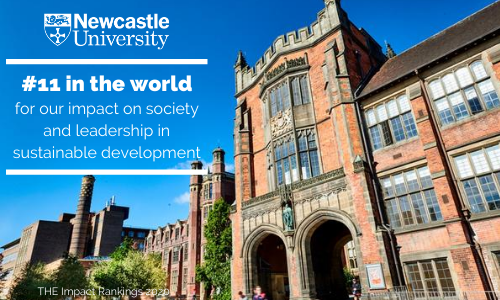A Newcastle University Centre of Research Excellence is being launched to help address ageing inequalities.
Major international organisations, including the United Nations, World Health Organization, OECD and EU, have been instrumental in encouraging countries to prepare for and respond to the challenges associated with demographic ageing.
However, an under-discussed and under-researched challenge is that not all older people can look forward to a wealthy, healthy or long life. Too often, research and policy development on ageing ignores the increasingly unequal lives of ageing adults.
Addressing inequality
In 2018, the UK government announced the ageing grand challenge: to increase average healthy life expectancy by five years by 2035 and to reduce inequalities in healthy life expectancy between the most and least deprived neighbourhoods.
On average, healthy life expectancy at birth is currently 18 years less in the most deprived neighbourhoods (52 years) compared to the least deprived (70 years).
The COVID-19 pandemic has highlighted the difficulties that older people can face. It has further accentuated inequalities, not only in access to health and social care but also through digital exclusion and loss of employment.
Our history. Our future.
The Centre for Ageing and Inequalities is a new Centre of Research Excellence at Newcastle University. The Centre builds on the University's long, successful and impactful history of ageing research.
Professor Brian Walker, PVC for Research Strategy and Resources at Newcastle University, said:
“We are delighted that the NU Centre for Ageing and Inequalities is launching this week. Healthier ageing is a priority across the globe, but it won’t be addressed by approaches which assume that ‘one size fits all’ or consider only single components within whole systems.
"The NU Centre for Ageing will build upon the superb legacy of research into ageing in Newcastle, and by bridging across disciplines it will inform a whole-systems approach that targets those most in need.”
The Centre addresses the ageing grand challenge by using a diverse range of methods, a multidisciplinary approach and a variety of data sources to transform our understanding of ageing and inequalities. We are:
- monitoring inequalities in ageing
- seeking to understand the causes of inequalities in ageing
- contributing to reducing inequalities in ageing for future generations
An interdisciplinary approach
The Centre for Ageing and Inequalities will reinforce existing interdisciplinary work and create opportunities for new connections.
We are combining work across areas including:
- inequalities
- health
- life expectancy
- incomes/pensions
- employment
- housing
- environment
- geography
- technology
- computing
- citizenship
- cultural forms of participation
Research collaboration
Our work involves collaboration with two key partner groups: the UK National Innovation Centre for Ageing and VOICE.
UK National Innovation Centre for Ageing
This world-leading Centre is using Ageing IntelligenceTM to generate new insights, patterns and learning to optimise the opportunities provided by the demographic revolution.
VOICE
This unique organisation is made up of a large network of citizens across the UK and internationally. Members contribute immense insights, experience, ideas and vision to identify unmet needs and opportunities, drive innovation on ageing and improve health research.
Research themes
The research carried out by the new Centre will cover six key themes, as follows:
- Demographic change
- Working lives - individuals and communities
- Public services, health and social care
- Ageing in place
- Cultures of ageing
- Technological responses to ageing inequalities
Each research theme tackles complex issues of inequalities in access to social, economic, environmental and technology resources. Our work reaches from local perspectives to global influence.
We are refining our understanding of inequalities by considering such factors as social and economic differences, gender, sex, ethnicity and place of residence.
Each research theme is outlined in more detail below.
Theme 1: Demographic change
This research theme addresses inequalities through the lens of demographic change within the UK and beyond. Through this research, we aim to:- explore the impact of inequalities across healthy life expectancy and healthy working lives
- increase understanding of differentials and influences on the drivers of population change
- deepen knowledge of the impact of different measures of inequality and the influence of policy and economics on inequality differentials across time and geography
- understand demographic change from the community perspective and how this may influence our ability to increase healthy ageing
Theme 2: Working lives – individuals and communities
This theme investigates the impact that social inequalities can have on ageing with relation to the welfare system, labour market and working lives. This includes how changes in work, work practices and the welfare state can impact on the future of inequalities in healthy ageing.
The Centre will work with colleagues across the University and with industry, VOICE and the National Innovation Centre for Ageing to develop a social impact index to ensure economic investment also yields improved well-being in local communities.
Theme 3: Public services, health and social care
This theme investigates the cost to society of unequal ageing and the societal benefits to individuals, employers and society from reducing inequalities.
The Centre will:
- consider the impacts of lifelong inequalities on health and social care usage in later life
- review the impact of welfare policies and the particularly complex challenge of inequalities at the end of life
- make international comparisons to improve understanding and identify potential solutions
Theme 4: Ageing in place
This research theme:
- conceptualises ageing and inequalities and the ways in which these evolve over time
- builds on ideas around accumulation of advantage/disadvantage in place and inequalities between and within places
- investigates physical aspects of the environment including:
- geography of inequality
- role of spatial context
- built environment
- environmental amenities, e.g. green and blue space
- disamenities, e.g. pollution
- examines the impact of social and economic aspects of place, including:
- opportunity structures
- collective social functioning and practice
- the impact of poverty rates and wages on inequalities
Theme 5: Cultures of ageing
This research theme addresses cultural representations and misrepresentations of ageing and later life. As part of this, the Centre aims to:- explore the different meanings associated with ageing by an increasingly diverse older population
- investigate forms of cultural participation and production across the life course
Theme 6: Technological responses to ageing inequalities
This theme explores the potential role of technology in reducing the impact of inequalities and
investigates ‘place-based’ technologies to mitigate inequalities.
We aim to:
- critically assess current technology use across different geographical areas in the North East of England
- articulate and understand digital exclusion, particularly its impact on inequalities as extenuated or amplified during times of crisis
From Newcastle. For better ageing.
Across the world, the need to transform our understanding of ageing is recognised as a key challenge.
Improving our understanding of inequalities will allow us to better understand the root causes of unequal ageing, and take practical steps to support people as they get older. However, our overall aim must be to reduce inequalities for current and future generations. Our new Centre for Ageing and Inequalities will play a key role in making this a reality.
You might also be interested in:
- Newcastle University Centre for Ageing and Inequalities
- Newcastle University's Strength in Ageing and Health
- Professor Fiona Matthews
- Faculty of Medical Sciences Research Themes
- Nic Palmarini to lead the UK National Innovation Centre for Ageing
- VOICE - providing public insights that inform priorities, develop deep understanding of consumer needs and impact product and service development
- Our plans to develop a 29 acre Campus for Ageing and Vitality incorporating elderly care, research facilities and more
Photo by Johnny Cohen on Unsplash



